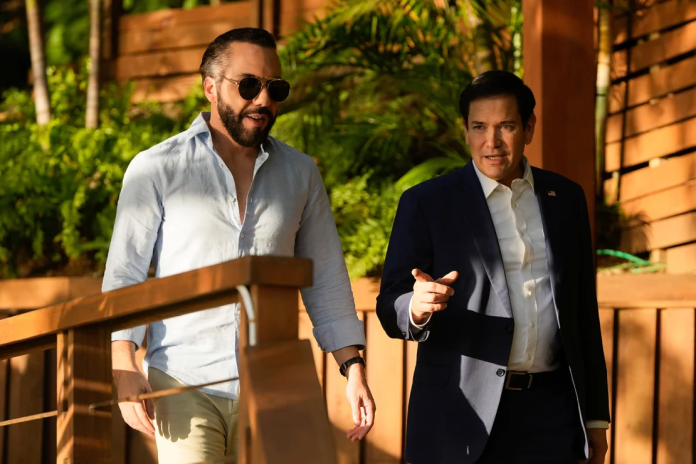El Salvador offered to house “dangerous criminals” deported from the United States in its prisons, US Secretary of State Marco Rubio announced on Monday after meeting with Salvadoran President Nayib Bukele, according to Reuters.
The proposal, part of the president Donald Trump administration’s efforts to ramp up deportations, could see El Salvador accepting not only its own citizens but also migrants from other countries, including US citizens or legal residents convicted of crimes.
Rubio, making his first foreign tour as chief US diplomat, is seeking regional support for migration policy. His efforts include reaching “third country” agreements to facilitate deportations to countries declining to accept their citizens.
Offer details
During nearly three hours of talks at Bukele’s residence outside the capital, the Salvadoran leader offered to incarcerate dangerous criminals deported from the US, including members of gangs like MS-13 and Tren de Aragua. Bukele later clarified on X that the offer extends to convicted US citizens, who would be held in El Salvador’s “mega-prison” in exchange for a fee.
The fee would be relatively low for the US but significant for us, making our entire prison system sustainable.
The US State Department has previously described prison conditions in El Salvador as “harsh and dangerous,” citing overcrowding, inadequate sanitation, and poor access to basic necessities like water and ventilation. Additionally, US citizens cannot legally be deported from the United States, raising questions about the feasibility of Bukele’s offer to house American convicts.
Since taking office in January, President Donald Trump has intensified deportations to Latin America, including using military planes for repatriation flights. On Monday, the administration also removed deportation protections for hundreds of thousands of Venezuelans in the US.
The move reflects the Trump administration’s broader strategy to outsource migration challenges, including expanding detention facilities at Guantanamo Bay to hold 30,000 people. However, Bukele’s offer raises ethical and legal concerns, particularly regarding the treatment of deportees and the potential for human rights violations in Salvadoran prisons.
As the US seeks to strengthen partnerships in the region, the agreement with El Salvador underscores the complex and often controversial measures being pursued to address migration and crime.
